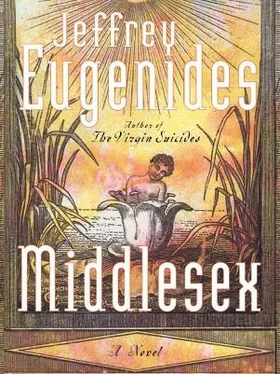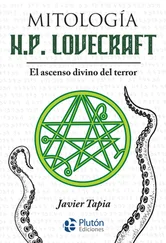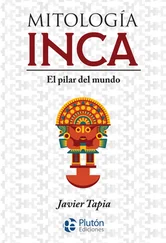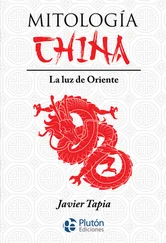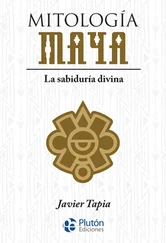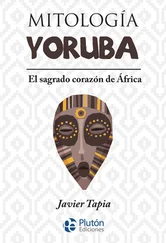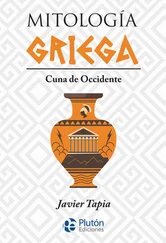Emotions, in my experience, aren’t covered by single words. I don’t believe in “sadness,” “joy,” or “regret.” Maybe the best proof that the language is patriarchal is that it oversimplifies feeling. I’d like to have at my disposal complicated hybrid emotions, Germanic train-car constructions like, say, “the happiness that attends disaster.” Or: “the disappointment of sleeping with one’s fantasy.” I’d like to show how “intimations of mortality brought on by aging family members” connects with “the hatred of mirrors that begins in middle age.” I’d like to have a word for “the sadness inspired by failing restaurants” as well as for “the excitement of getting a room with a minibar.” I’ve never had the right words to describe my life, and now that I’ve entered my story, I need them more than ever. I can’t just sit back and watch from a distance anymore. From here on in, everything I’ll tell you is colored by the subjective experience of being part of events. Here’s where my story splits, divides, undergoes meiosis. Already the world feels heavier, now I’m a part of it. I’m talking about bandages and sopped cotton, the smell of mildew in movie theaters, and of all the lousy cats and their stinking litter boxes, of rain on city streets when the dust comes up and the old Italian men take their folding chairs inside. Up until now it hasn’t been my world. Not my America. But here we are, at last.
The happiness that attends disaster didn’t possess Desdemona for long. A few seconds later she returned her head to her husband’s chest—and heard his heart beating! Lefty was rushed to the hospital. Two days later he regained consciousness. His mind was clear, his memory intact. But when he tried to ask whether the baby was a boy or a girl, he found he was unable to speak.
According to Julie Kikuchi, beauty is always freakish. Yesterday, over strudel and coffee at Café Einstein, she tried to prove this to me. “Look at this model,” she said, holding up a fashion magazine. “Look at her ears. They belong on a Martian.” She started flipping pages. “Or look at the mouth on this one. You could put your whole head in it.”
I was trying to get another cappuccino. The waiters in their Austrian uniforms ignored me, as they do everyone, and outside, the yellow lindens were dripping and weeping.
“Or what about Jackie O.?” said Julie, still advocating. “Her eyes were so wide-set they were basically on the sides of her head. She looked like a hammerhead.”
I’m working up with the foregoing to a physical description of myself. Baby pictures of the infant Calliope show a variety of features on the freakish side. My parents, looking fondly down into my crib, got stuck on every one. (I sometimes think that it was the arresting, slightly disturbing quality of my face that distracted everyone’s attention from the complications below.) Imagine my crib as a diorama in a museum. Press one button and my ears light up like two golden trumpets. Press another and my stark chin begins to glow. Another, and the high, ethereal cheekbones appear out of the darkness. So far the effect isn’t promising. On the evidence of ears, chin, and cheekbones I might be a baby Kafka. But the next button illuminates my mouth and things begin to improve. The mouth is small but well shaped, kissable, musical. Then, in the middle of the map, comes the nose. It is nothing like the noses you see in classical Greek sculpture. Here is a nose that came to Asia Minor, like silk itself, from the East. In this case, the Middle East. The nose of the diorama baby already forms, if you look closely, an arabesque. Ears, nose, mouth, chin—now eyes. Not only are they widely set (like Jackie O.’s), they’re big. Too big for a baby’s face. Eyes like my grandmother’s. Eyes as big and sad as the eyes in a Keane painting. Eyes rimmed with long, dark eyelashes my mother couldn’t believe had formed inside her. How had her body worked in such detail? The complexion around these eyes: a pale olive. The hair: jet black. Now press all the buttons at once. Can you see me? All of me? Probably not. No one ever really has.
As a baby, even as a little girl, I possessed an awkward, extravagant beauty. No single feature was right in itself and yet, when they were taken all together, something captivating emerged. An inadvertent harmony. A changeableness, too, as if beneath my visible face there was another, having second thoughts.
Desdemona wasn’t interested in my looks. She was concerned with the state of my soul. “The baby she is two months old,” she said to my father in March. “Why you still no baptize her?” “I don’t want her baptized,” answered Milton. “It’s a bunch of hocus-pocus.” “Hokey pokey is it?” Desdemona now threatened him with an index finger. “You think Holy Tradition that the Church keep for two thousand years is hokey pokey?” And then she called on the Panaghia, using every one of her names. “All-Holy, immaculate, most blessed and glorified Lady, Mother of God and Ever-Virgin, do you hear what my son Milton is saying?” When my father still refused, Desdemona unleashed her secret weapon. She started fanning herself.
To anyone who never personally experienced it, it’s difficult to describe the ominous, storm-gathering quality of my grandmother’s fanning. Refusing to argue anymore with my father, she walked on swollen ankles into the sun room. She sat down in a cane chair by the window. The winter light, coming from the side, reddened the far, translucent wing of her nose. She picked up her cardboard fan. The front of the fan was emblazoned with the words “Turkish Atrocities.” Below, in smaller print, were the specifics: the 1955 pogrom in Istanbul in which 15 Greeks were killed, 200 Greek women raped, 4,348 stores looted, 59 Orthodox churches destroyed, and even the graves of the Patriarchs desecrated. Desdemona had six atrocity fans. They were a collector’s set. Each year she sent a contribution to the Patriarchate in Constantinople, and a few weeks later a new fan arrived, making claims of genocide and, in one case, bearing a photograph of Patriarch Athenagoras in the ruins of a looted cathedral. Not appearing on Desdemona’s particular fan that day, but denounced nonetheless, was the most recent crime, committed not by the Turks but by her own Greek son, who refused to give his daughter a proper Orthodox baptism. Desdemona’s fanning wasn’t a matter of moving the wrist back and forth; the agitation came from deep within her. It originated from the spot between her stomach and liver where she once told me the Holy Spirit resided. It issued from a place deeper than her own buried crime. Milton tried to take shelter behind his newspaper, but the fan-disturbed air rustled the newsprint. The force of Desdemona’s fanning could be felt all over the house; it swirled dustballs on the stairs; it stirred the window shades; and, of course, since it was winter, it made everyone shiver. After a while the entire house seemed to be hyperventilating. The fanning even pursued Milton into his Oldsmobile, which began to make a soft hissing from the radiator.
In addition to the fanning, my grandmother appealed to family feeling. Father Mike, her son-in-law and my very own uncle, was by this time back from his years in Greece and serving—in an assistant capacity—at Assumption Greek Orthodox Church.
“Please, Miltie,” Desdemona said. “Think of Father Mike. They never give him top job at the church. You think if his own niece she no gets baptized it will look good? Think of your sister, Miltie. Poor Zoë! They no have much money.”
Finally, in a sign that he was weakening, my father asked my mother, “What do they charge for a baptism these days?”
“They’re free.”
Milton’s eyebrows lifted. But after a moment’s consideration he nodded, confirmed in his suspicions. “Figures. They let you in for free. Then you gotta pay for the rest of your life.”
Читать дальше
Конец ознакомительного отрывка
Купить книгу
